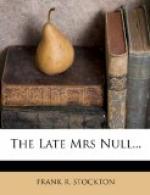“Yes,” said Lawrence, “on some occasions.”
And, forthwith, she began upon the first chapter; and having read five lines of this, she went back and read the title page, suddenly remembering that Mr Croft liked to begin a book at the very beginning. Miss Annie had been accustomed to read to her father, and she read aloud very well, and liked it. As she sat there, shaded by a great locust tree, which had dropped so many yellow leaves upon the grass, that, now and then, it could not help letting a little fleck of sunshine come down upon her, sometimes gilding for a moment her light-brown hair, sometimes touching the end of a crimson ribbon she wore, and again resting for a brief space on the toe of a very small boot just visible at the edge of her dress, Lawrence looked at her, and said to himself: “Is it possible that this is the rather pale young girl in black, who gave me change from behind the desk of Mr Candy’s Information Shop? I don’t believe it. That young person sprang up, temporarily, and is defunct. This is some one else.”
She read three chapters before she considered it time to go into the house to see if it was necessary for her to do anything about dinner. When she left him, Lawrence turned again to his writing.
That afternoon, he sent Mrs Null a little note on the back of a card, asking her if she could let him have a few more sheets of paper. Lawrence found this request necessary, as he had used up that day all the paper she had sent him, and the small torn pieces of it now littered the fireplace.
“He must be writing a diary letter,” said Miss Annie to herself when, she received this message, “such as we girls used to write when we were at school.” And, bringing down a little the corners of her mouth, she took from her stationery box what she thought would be quite paper enough to send to a man for such a purpose.
But, although the means were thus made abundant, the letter to Miss March was not then written. Lawrence finally determined that it was simply impossible for him to write to the lady, until he knew more. What Keswick had told him had been absurdly little, and he had hurried away before there had been time to ask further questions. Instead of sending a letter to Miss March, he would write to Keswick, and would put to him a series of interrogations, the answers to which would make him understand better the position in which he stood. Then he would write to Miss March.
The next day Miss Annie could not read to him in the morning, because, as she came and told him, she was going to Howlett’s, on an errand for her aunt. But there would be time to give him a chapter or two before dinner, when she came back.
“Would it be any trouble,” said Lawrence, “for you to mail a letter for me?”
“Oh, no,” said Miss Annie, but not precisely in the same tone in which she would have told him that it would be no trouble to read to him two or three chapters of a novel. And yet she would pass directly by the residence of Miss Harriet Corvey, the post-mistress.




